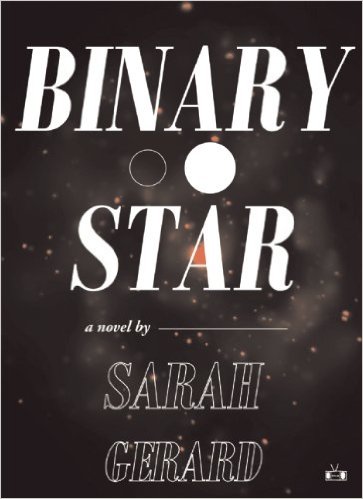Review: BINARY STAR by Sarah Gerard

Review by REEM ABU-BAKER
Sarah Gerard’s novel Binary Star plunges readers into the mind of its unnamed narrator as she struggles with anorexia and bulimia, road-trips around the States with her alcoholic long-distance boyfriend John, and studies and teaches astronomy at Adelphi University. The narrator’s thoughts are punctuated by brief sections referencing the star systems that she studies. The lyrical narration shifts feverishly between time and space, between thought and dialogue, internal and external—the setting is a field in North Dakota, a strip club in New Orleans, a classroom in New York, the diet page of a celebrity gossip rag, the looping thoughts of the narrator’s disease.
Fictional portrayals of unwell young adults often run the risk of romanticizing addiction and self-hatred. There is a point at the beginning of Binary Star—with lines like “[They would] reimagine themselves as cosmic beings, bound by nothing. … They called it psychosis” working to flatten the cosmic and the bodily—when I worried that a lyric novel about both anorexia and star systems would inevitably fall into this trap and be a beautiful book about a beautiful wounded girl. Instead, Gerard presents these romanticizations, but rejects them by forcing the reader, almost cruelly, to understand the unnamed female narrator’s eating disorder, her quest for perfection, her obsession with the size and shape of the self. I see myself in the counted celery sticks, the endless coffees and Red Bulls. Gerard highlights the ordinariness of these routines and worries, but the narrator’s sickness never relents. Gerard subjects the reader to it, the endless repetition of refusal, weigh-ins, purges, lies. Caffeine and energy drinks and beers on empty stomachs. To read Binary Star is to feel the tedium and the fatigue, to want the narrator to sleep, to laugh, to get better. She doesn’t. The cycles repeat.
The core of Binary Star is its prose. The narrator is driven by obsession, and she renders her thoughts in short sentences stitched into almost-as-short paragraphs, so the type on the page almost appears lineated. A glance says that this world is stuttering and broken.
The novel’s disjointed structure relies in part on the poetic pressure Gerard places on language. Words slip between their multiple meanings. The celestial body becomes the narrator’s body. Matter into matter, mass into mass. The stars in the sky and the stars in the tabloids. Which kind of revolution are we talking about now? At times, the prose even slips into chant, which helps illuminate the uncomfortably performative aspects of unhealthy behavior while also lending a rhythm and speed for the reader:
Tomorrow, I will lead a test on starlight.
1. Stars are born in clouds of gas and
a. Things
b. Arms
c. Tummy
d. Ass
Stars are born of gravitational collapse.
Stay away from the vodka, John.
One more.
Two less.
A hundred.
More.
A dense, hot core.
Binary Star is also a road novel. Gerard is refreshingly honest about the long road trip the narrator and John take—mostly it’s just the ugly outskirts of cities, and long expanses of nothing scattered with gas stations, chain restaurants, and motels. Mostly it’s kind of rote and boring, the U.S. another nauseating backdrop for the narrator and John to enact their codependency against. Perhaps this sounds like a criticism, but it isn’t. The narrative never really dwells on the place of the road, and the way the characters experience it provides a necessary relatability to a book that so frequently dwells in a sense of disassociation.
Although they both struggle with their own self-destructive, addictive behavior, John and the narrator occupy their environments in nearly opposite ways. Alcoholic, volatile John takes up space, takes up arms against whatever is outside of him. He fights his surroundings. The narrator tries to disappear, tries to get her body to eat itself. She wants the world to hurt her.
And yet, despite the bodily nature of the narrator’s illness, her narration is decidedly disembodied. The first person voice weighs herself on the hour, examines her profile in the mirror, fantasizes about what she could look like. What she wants most of all is not a smaller body or a different body, but no body at all. At times, the narration seems to come from the stars, something gaseous, suspended.
Early in Binary Star, John joins the narrator in her veganism (which she claims is for health reasons) after he reads a book about factory farming. John’s movement into alcoholism corresponds to the growing militancy of his beliefs. He identifies as a liberator of animals, and he promotes their cause by verbally attacking the humans around him. The narrator’s movement toward animal rights activism seems, at first, an act of passivity, something she adopts because she is pulled around by John. It’s in the last pages of the book when the narrator says, “I read books on animal liberation. I feel they’re about me.”
And in this line, this moment of honesty, lies the success of Gerard’s novel. There is not much kindness in this story, whether between characters, within the narrator, or towards the reader. And yet, in all the pulsing sickness and the opposing desires to fight and to vanish altogether, the book illuminates some of the worst parts of ourselves. The edges, the bones, the desire to hurt and be hurt. There is a sense, too, of other possibilities—how somewhere on the other side lies passion and love, for living creatures and dead stars.